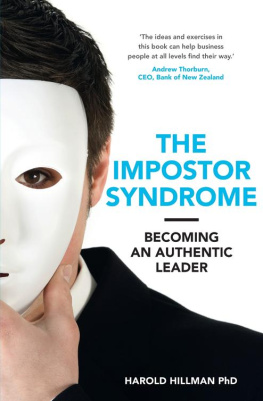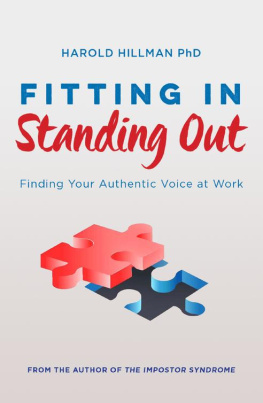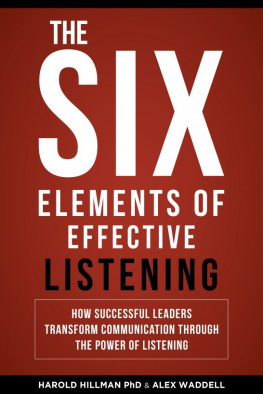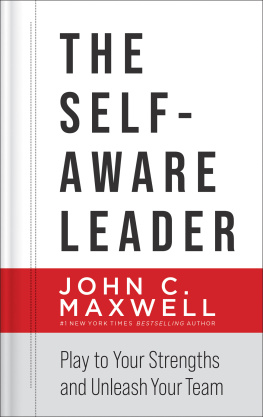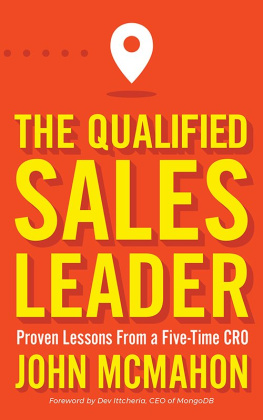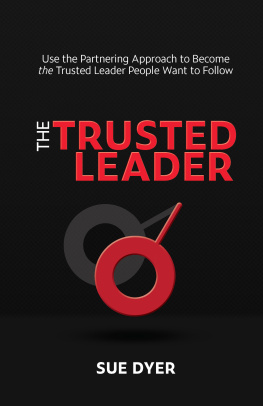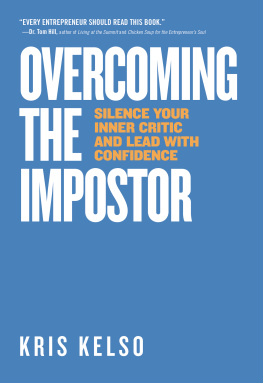Leadership is not complicated. For me, it starts with being true to yourself and having the confidence to be who you are, wherever you are. The real challenge is to find yourself in the first place. The Impostor Syndrome speaks directly to everyone trying to find the defining line between the real me and the me others expect me to be and it does so with style, humour and plenty of sound advice.
I have worked with Harold Hillman for a number of years and he has offered honourable and wise counsel at all times. He is insightful, thoughtful and trustworthy. Harolds ideas on Impostor Syndrome are very true: many executives lack confidence and belief in themselves. Leadership has to be practical; it has to be about who you are, not some kind of theory. The ideas and the exercises in this book can help business people at all levels find their way by giving them the courage to admit their weaknesses so they can work on them and improve, and allowing them to take that final step into the space of a true leader.
Andrew Thorburn, CEO, Bank of New Zealand
Harold helped us realise at Refining NZ that when we employ people for their thinking, we have to make sure they arent pressured to moderate their views to fit what is acceptable around here. I understand so much more now after reading The Impostor Syndrome. The linkage between authenticity and leadership is magical. I hope the book provides that eye-opening experience to others.
Ken Rivers, former CEO, Refining NZ
In my experience far too many people are their own worst critics. Women especially are vulnerable to the limitations of self-doubt. We worry too much about presenting what others expect of us rather than allowing ourselves to trust our own skills, experience and judgement. Harold Hillmans book is a must-read for anyone who has experienced this feeling, but it especially resonates for me because it conveys the power of authenticity in a practical yet compelling way. If we have the courage as leaders to be ourselves, to show our vulnerabilities as well as our strengths, then Impostor Syndrome will not flourish in our organisations and people will have a much better chance to reach their true potential.
Barbara McKerrow, Chief Executive, New Plymouth District Council
Be yourself it sounds simple, so why do we make it hard, particularly in a business context? It takes insight and reflection to really know yourself, and courage to live and show the true you. Weve all been impostors at some time, hiding our true selves. Harold demystifies Impostor Syndrome, showing us that its okay and common to feel that way, but that the sooner we get over it and live authentically, the better off we and everyone around us will be. Read it and find yourself!
Alison Andrew, Executive Global Head, Chemicals, Orica
I love this book! It is brilliant, timely and in a form that can be easily digested by anyone who wants to understand why authenticity makes a difference. The strategies to cope with Impostor Syndrome will resonate on so many levels and with a broad spectrum of readers. This is an important must-read book for anyone who is ready to take their leadership to the next level.
Graham Stuart, CEO, Sealord
Amongst the plethora of books written on leadership, The Impostor Syndrome stands out as providing valuable insight into the essence and importance of an authentic approach along with a practical how-to toolkit. For those looking to become a highly regarded and effective leader or eager to create an environment where authentic leaders can flourish, this book contains much to recommend it.
Chris Black, Chief Executive, FMG
I know what it is like to feel like an impostor. I have lived that experience a few times in my life, during the early years and well into adulthood. My stories are your stories. All of our impostor stories give rise to a powerful insight about the importance of finding and being our authentic selves.
This book is written for anyone who is currently wearing the impostors mask, and is dedicated to everyone in the world who has ever worried that being yourself is simply not good enough.
Above all else, always remember that there has only ever been, and will always only be, one you.
All successful executives have employed their personal ambition to advance their careers and influence. By itself, ambition is a motivating emotion or a personal attribute. Ambitious people have a history of pushing themselves to their learning edge and taking on big challenges, knowing that the stakes are high, inadvertently setting up their experience of Impostor Syndrome.
Ambition is an interesting word. In Latin, the original verb was ambire, to go around a circuit, usually meant for soliciting favour or votes. A driving force was ambition, or a desire for something. The ambitus is the circuit, edge or periphery. A person who has ambition is driven by a personal desire to ask others to support her/his advancement.
When paired with avarice, ambition mutates into greed. Greed has been a part of recorded history since biblical times, and has thrived since the 1980s the decade of greed. Peter Koestenbaum, published philosopher and mentor, explains that this avaricious expression of ambition feeds on other people, takes away in order to get, offends, breeds envy, and leads to isolation from the world. People seem to have a limited tolerance for unbridled greed, and eventually respond with policies and practices (including violence) to control such ambitious people. Unfortunately, significant if not irreparable damage has been done. This book isnt interested in this type of ambition.
Pair ambition with aspiration and greatness can happen. Servant leadership can emerge. Aspiration is the driving force behind a personal vision, a desire to create something good or better, a longing for perfection. Koestenbaum sees this strain of ambition as an ongoing dissatisfaction with what is and an insatiable appetite for realizing potentials that, by definition, can never be fulfilled. Servant leaders envision a better future for their organisation, neighbourhood or society, and believe they can bring people and circumstances together to create that desired future. Servant leaders engage their own ambition to inspire and guide the collective aspiration of the people they serve. All are served well and benefit.
Ambition can be channelled by two governors: integrity and self-awareness . Integrity means adherence to a moral code or ethics. Moral codes are determined by families, tribes, religious groups, societies, or any social organising force, such as armies and gangs. If ambitious leaders believe they should not lie, cheat, steal or covet, their behaviours will be channelled away from those choices. If ambitious leaders believe the end result justifies the means, their behaviours will reflect a diversity of methodologies and techniques for achieving their goals regardless of collateral damage. Finding ones moral code requires deep reflection on lessons learned from others, difficult choices made in the course of becoming an adult, and strategies employed to advance in ones career. Being ethical requires knowing the lines of integrity that are firm, not to be crossed.

